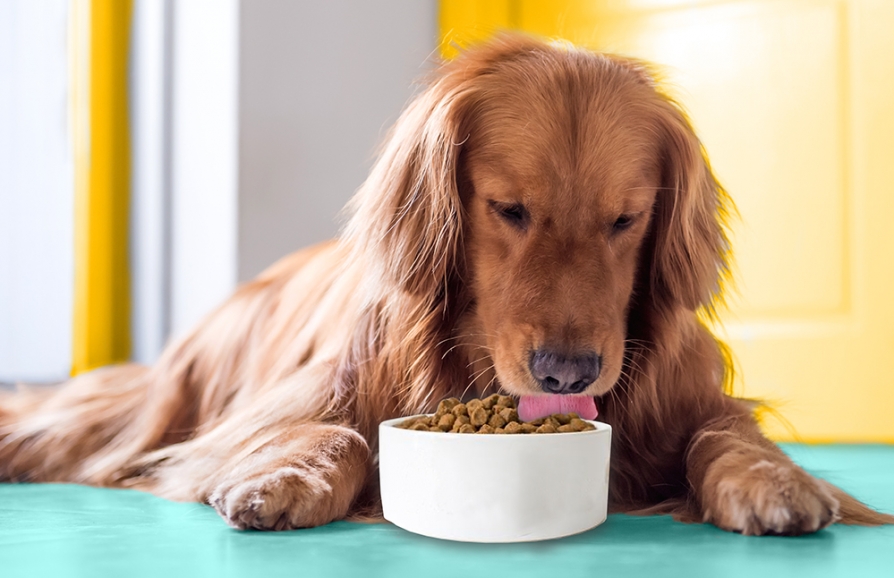Ageing in Pets – New diets
- October 5th 2021

What your dog eats has a direct impact on how healthy and fit they feel, which is why choosing the right diet for your senior dog is very important. In this blog, we’ll talk you through some of the factors you need to consider as your dog ages and you design a new diet for them.
How old is your pet?
Just as puppies need a certain amount of calories that are designed to help them grow and become adult dogs, senior dogs need another set of calories that reflect their activity levels, their metabolisms, and their upcoming physical changes. It all comes down to nutritional requirements: what a senior dog needs will be very different from what a puppy needs.
But it also depends on how old your senior dog is. Canines that have just turned seven or eight have a tendency to put on weight because their metabolism has slowed. But very old dogs tend to lose weight—and muscle—as they grow older and frailer. The nutritional needs of those two dogs are not the same.
The Pet Project recommends that you always speak to your vet when designing a diet for your dog. It’s important to have expert advice on hand, especially someone who can see your pet’s medical history and recommend the best course of action to keep them healthy. Below, we’ve outlined a few general tips on what senior dogs usually need when it comes to a good and balanced diet.
Protein
Senior dogs need more protein than adult dogs or pups because they tend to lose muscle mass a lot faster. It was believed that protein for senior dogs is bad because it’s difficult for the kidneys to process, but that myth has been debunked. Senior dogs who don’t get enough protein can lose muscle mass to a dangerous level, often to the point of not being able to sit up on their own or go for walks.
It’s generally recommended that senior dogs get around 25-30% more protein than their younger counterparts. Some guides say 50%. Check with your vet on what they recommend for your dog, as they will know your pet’s fitness level, overall health, and current diet.
Fibre
How much fibre your dog needs will depend on their exercise level and whether they need to lose or gain weight. If your pet is putting on the pounds and you need to get them fit again, then a high fibre diet is great for filling them up but restricting the calories. If, however, your pet is losing weight and has a limited appetite to begin with, a high fibre diet may not be the best option.
Fibre is good for digestion in general, so it definitely plays a role in your senior dog’s diet. It can help prevent constipation, which can be a problem as your dog ages.
The right nutrients
Nutrients are obviously very important for a senior dog’s diet, but choosing which nutrients may depend on what diseases your dog is likely to develop. Heart disease and kidney disease, for example, are two of the big conditions you need to watch out for when choosing the nutrients for your senior dog. Check with your vet on what nutrient levels they recommend, and in what balance.
Your dog’s breed will also play a big role in what diseases they’re inclined towards. Doberman Pinschers are known to develop heart conditions in later life, while Miniature Schnauzers have a higher risk of developing diabetes. Google should give you a pretty extensive list of what to watch out for when it comes to your dog’s breed but, as always, run the list past your vet and follow their advice.
Supplements
Supplements can be very good for senior dogs and a necessary part of a balanced diet. Omega-3 and fatty acids especially can play a huge role in keeping your dog mentally sharp, and aiding with joint problems. There are plenty of supplements available online or in pet stores, but run the brand through your vet and get their recommendation on the dosage. Too much is also not good for your pet.
Keep them hydrated
Older dogs tend to get thirsty a lot faster than younger dogs, even though they aren’t as active. This is because a lot of the medication they take for their health problems can dry out their mouth faster. Medication can also cause them to pee more, which means they need more water. Senior dogs also have a higher chance of developing diabetes, which tends to dry out the mouth and make them very thirsty.
Part of keeping your senior dog healthy is making sure you have a supply of fresh clean water always available, in a place they can easily access. So there’s no point in putting the bowl in the kitchen if your kitchen door is always closed, or on a shelf that your dog can’t reach unless you take the bowl down for them. Keep the water bowl in a fixed spot that your pet can get to without needing assistance. And make sure you don’t move it around too much. As dogs get older, they tend to lose their sense of sight and smell, which makes it harder for them to find things if they’ve been moved. Familiarity is comfort!
